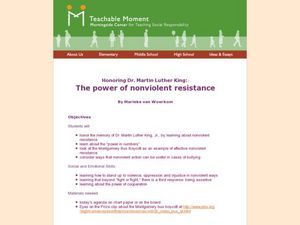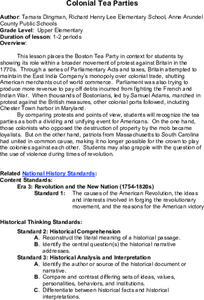National Endowment for the Humanities
Martin Luther King, Jr. and Nonviolent Resistance
Was nonviolent resistance the best means of securing civil rights for black Americans in the 1960s? In this highly engaging and informative lesson, your young historians will closely analyze several key documents from the civil rights...
Curated OER
The Art of Protesting
Students view various images to examine different types of protest Americans have used throughout history, and explore ways in which protest can produce change for better or worse.
Curated OER
Concept Formation Lesson Plan: Understanding "Protest"
After analyzing both examples and non-examples of a variety of protests conducted by ethnic groups in Seattle and the state of Washington during the twentieth century, your class members will work to identify the key ideas and...
iCivics
Students Power Elections
A High schoolers Power Elections resource guide provides would-be voters with the guidance they need to become voters. Included in the packet is information about voter registration and voting, how to research candidates and ballot...
PBS
Breaking the Code: Actions and Songs of Protest
Ezell Blair, Jr., David Richmond, Franklin McCain and Joseph McNeil changed history. Their sit-in at the lunch counter of the Woolworths in Greensboro, North Carolina on February 1, 1960 became a model for the nonviolent protests that...
ProCon
National Anthem Protests
San Francisco 49ers quarterback Colin Kaepernick refused to stand for the National Anthem in 2016 as a form of protest. Were his actions appropriate? Using the provided website, pupils attempt to decide for themselves by reading the main...
Atlanta History Center
Civil Disobedience and the Atlanta Student Movement
What tactics are used in civil disobedience? Learners study the conditions in Alabama that led to the establishment of the Atlanta Student Movement, as well as consider the nature and effectiveness of civil disobedience.
Curated OER
Lesson: Tlatelolco: Mexican Student Massacre 1968
The Massacre of Tlatelolco is the focus of a discussion-based instructional activity. Civil-minded learners consider the nature of student movements that have ended in violence based on over-reaction and government oppression. They...
National Endowment for the Humanities
Revolution '67, Lesson 1: Protest: Why and How
To some people, protesting is as American as apple pie, but the factors that lead to protests can be as confusing to veteran activists as to today's youth. Revolution '67 explores the riots in Newark, New Jersey as a case study. ...
Curated OER
Protests against Bush
Non-violent conflict resolution is the focus of this lesson, which addresses the protests against President Bush in the UK (2003). Students list the strengths and limitations of non-violent conflict resolution, and chart the cycles of...
Annenberg Foundation
Poetry of Liberation
How do writers use words to protest injustice, challenge the status quo, and shape their own identities? Individuals watch and discuss a video, read author biographies, write poetry and journals, develop a slideshow, and complete a...
Curated OER
"Uncle Sam's Got Himself in a Terrible Jam": Protest Music and the Vietnam War
"And it's one, two, three...what are we fighting for?" Use music to assess the climate of protest during the Vietnam War, listening to and analyzing Country Joe MacDonald's "I-Feel-Like-I'm-Fixin'-To-Die Rag" (lyrics included)....
Curated OER
Songs of Mass and Individual Protest: USA, Jamaica, and South Africa
Students study songs of mass and individual protest. They view a video clip and discuss the song and words the protesters sing. They study the song, "We Shall Overcome" and discuss the characteristics of the song and chant and sing it....
Facing History and Ourselves
Protesting Discrimination in Bristol
Using the Bristol Bus Boycott as a case study, class members examine the strategies and levels of power protesters used to effect change. The two-day activity concludes with individuals reflecting on the actions they might take in face...
Curated OER
25 Greatest Protest Songs
Students view and discuss The 25 Greatest Protest Songs video as compiled by VH1. They focus on when and why each of the songs were written, looking for patterns.
Curated OER
Protesting within First Amendment Rights
Students research the First Amendment and what it says about the right to peaceably assemble as well as read in particular about those who were arrested or removed from an area for being disruptive during a protest on the War in Iraq....
Curated OER
The Power of Nonviolent Resistance
Learners discuss the power of nonviolent resistance in terms of Dr. Martin Luther King and the boycotts that he led. In this nonviolent resistance lesson plan, students discuss their thoughts of nonviolent resistance and how they can use...
PBS
Civic Engagement and How Students Can Get Involved
There is no age limit on civic engagement. Even if your pupils are not old enough to vote, they are old enough to get involved. Show them how with a PBS instructional activity that underscores the importance of civic participation and...
Curated OER
Gandhi's Voice: Writing as Nonviolent Resistance
Ninth graders identify how Mahatma Gandhi used writing as a means of nonviolent communication. In this nonviolent resistance lesson, 9th graders watch a film about Gandhi as a writer and identify characteristics of nonviolent activism....
Curated OER
The Exploration of the Writer, His Louisiana History And the Autobiography of Miss Jane Pittman By Ernest J. Faines
Young scholars identify the significance of the author's experiences on his written work; describe the hardships faced by slaves and plantation owners once the caves were set free; explain the role of the Seceses and why they were a...
Curated OER
The Vietnam War: War Protest and America
Young scholars discuss the article 'Bowling Alone'. They discuss the notes over war protest in the US during the Vietnam War. Students identify the main ideas of the article 'Bowling Alone.' They discuss the lecture on the war protest in...
National Constitution Center
Born in the U.S.A: Music as Political Protest
Though often used in shows of patriotism, Bruce Springsteen's 1985 song "Born in the U.S.A." is critical of America's role in the Vietnam war and its treatment of American veterans. High schoolers analyze the song's lyrics in an activity...
Center for History Education
Colonial Tea Parties
Most people know of the Boston Tea Party, but it was only one of similar protests throughout the colonies. Using a case study from Maryland, learners explore primary sources, including images and newspaper accounts of similar tea...
Benjamin Franklin Tercentenary
Reading the Work of B. Franklin, Printer
Placing Ben Franklin’s ideas about a free press next to those embodied in the First Amendment sheds light on both. Learners interpret and compare two primary sources and then examine them in the light of a contemporary survey about...























